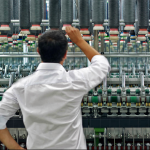The OEKO-TEX Association, in commemoration of its 25th Anniversary, commissioned a global research study to assess consumer attitudes about textile sustainability. The results of this research project are being released this week. Entitled “The Key to Confidence: Consumers and Textile Sustainability — Attitudes, Changing Behaviors and Outlooks,” the study of more than 11,000 clothing and home textile consumers around the world examined topics ranging from concerns about climate change to harmful substances in textiles.
The findings from the study were released to OEKO-TEX Institute clients through a series of webinars and will be shared with the textile, home fashions and apparel industry via speaking engagements at upcoming industry events, webinars and other communiques.
“The OEKO-TEX portfolio of testing, certification, and label products has increased substantially since we first entered the market in 1992,” said Anna Czerwinska, head of marketing and communication at OEKO-TEX. “The world’s issues and consumer attitudes have changed just as significantly. As long-time leaders in textile sustainability, we felt that this unique global study to quantify consumer attitudes about textile sustainability was a fitting tribute to our past twenty-five years as well as a worthy undertaking to prepare us to succeed in the next.”
OEKO-TEX engaged consumer products researcher Ellen Karp and her company, Anerca International, to conduct the project. Karp works on sustainability and other branding issues with a wide array of the apparel, personal care and luxury brands. The Key to Confidence project was about a year in the making and was fielded in June. The more than 11,000 clothing and home textile consumers in the study completed an online survey with a full spectrum of questions designed to gauge their attitudes about sustainability, harmful substances, environmental responsibility and the social welfare of textile workers.
“The quantitative findings derived through The Key to Confidence study should serve as a call to action for the textile industry,” said Karp. “Consumers are fast learning that their textile buying decisions impact not only their families but also their communities and beyond. Brands, retailers and manufacturers need to be ready for this awakening. It is definitely coming.”















